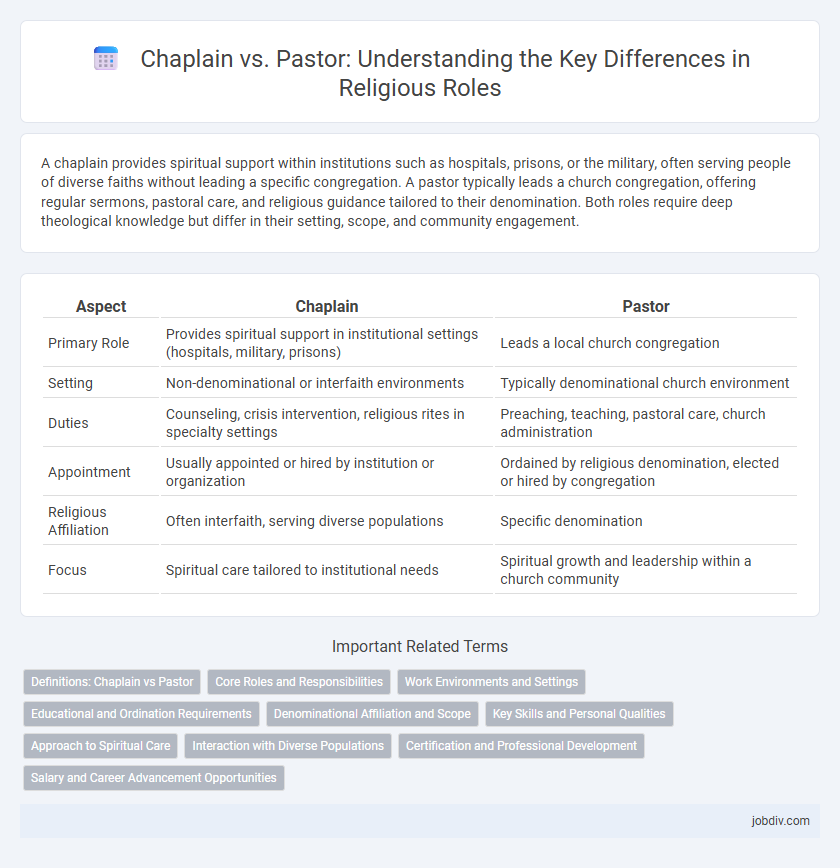A chaplain provides spiritual support within institutions such as hospitals, prisons, or the military, often serving people of diverse faiths without leading a specific congregation. A pastor typically leads a church congregation, offering regular sermons, pastoral care, and religious guidance tailored to their denomination. Both roles require deep theological knowledge but differ in their setting, scope, and community engagement.
Table of Comparison
| Aspect | Chaplain | Pastor |
|---|---|---|
| Primary Role | Provides spiritual support in institutional settings (hospitals, military, prisons) | Leads a local church congregation |
| Setting | Non-denominational or interfaith environments | Typically denominational church environment |
| Duties | Counseling, crisis intervention, religious rites in specialty settings | Preaching, teaching, pastoral care, church administration |
| Appointment | Usually appointed or hired by institution or organization | Ordained by religious denomination, elected or hired by congregation |
| Religious Affiliation | Often interfaith, serving diverse populations | Specific denomination |
| Focus | Spiritual care tailored to institutional needs | Spiritual growth and leadership within a church community |
Definitions: Chaplain vs Pastor
A chaplain is a religious leader who provides spiritual support and counseling within secular institutions such as hospitals, military units, or prisons, often serving a diverse group of individuals regardless of their faith background. A pastor is a clergy member who leads a specific congregation or church, responsible for preaching, administering sacraments, and guiding the spiritual growth of their community. The key distinction lies in the chaplain's institutional and multi-faith role versus the pastor's congregational and denominational leadership.
Core Roles and Responsibilities
Chaplains provide spiritual support and counseling primarily within institutions such as hospitals, military, prisons, and universities, addressing diverse faith needs in secular environments. Pastors lead congregations in churches, delivering sermons, administering sacraments, and offering pastoral care within a specific religious community. Both roles emphasize spiritual guidance, but chaplains operate in pluralistic settings while pastors focus on nurturing their faith community.
Work Environments and Settings
Chaplains typically work in diverse institutional settings such as hospitals, military bases, prisons, and universities, providing spiritual care to people of various faiths and backgrounds. Pastors primarily serve within church congregations, leading worship services, delivering sermons, and offering pastoral care to members of their specific faith community. The work environment of a chaplain demands adaptability to secular or multi-faith contexts, while pastors operate in a more defined religious setting focused on community leadership and spiritual growth.
Educational and Ordination Requirements
Chaplains typically require specialized training in both religious studies and counseling, often obtaining certification through organizations such as the Association of Professional Chaplains, with an emphasis on interfaith knowledge and clinical experience. Pastors generally complete formal theological education, earning degrees like a Master of Divinity (M.Div.) from a seminary or Bible college, followed by ordination through their specific denomination. Ordination for pastors is usually granted after demonstrating theological competence, pastoral skills, and adherence to denominational doctrines, whereas chaplain certification focuses more on clinical pastoral education and the ability to serve diverse institutional settings.
Denominational Affiliation and Scope
Chaplains typically serve in institutional settings such as hospitals, military, or prisons and often provide interdenominational or non-denominational spiritual support, accommodating diverse faith traditions. Pastors usually lead a specific local congregation within a particular Christian denomination, providing doctrinal guidance and religious services aligned with their denominational beliefs. The scope of a chaplain's role is broader and more ecumenical, while a pastor's responsibilities are closely tied to the faith practices and community of their church.
Key Skills and Personal Qualities
Chaplains require strong counseling skills, cultural sensitivity, and the ability to provide spiritual support in diverse, often high-stress environments such as hospitals, military units, or prisons. Pastors emphasize leadership, preaching, and community-building skills, focusing on guiding congregations through teaching, worship, and pastoral care. Both roles demand empathy, excellent communication, and a deep commitment to faith, but chaplains prioritize adaptability and crisis intervention, while pastors focus on long-term spiritual growth and congregational development.
Approach to Spiritual Care
Chaplains provide spiritual care in diverse settings such as hospitals, military, and prisons, offering non-denominational support tailored to individuals' unique beliefs and needs. Pastors typically serve within a specific congregation, delivering spiritual guidance, sermons, and sacraments aligned with their denominational doctrine. The chaplain's approach prioritizes inclusivity and emotional support, while pastors emphasize community leadership and doctrinal teaching.
Interaction with Diverse Populations
Chaplains often serve in settings like hospitals, military, and prisons, providing spiritual support to individuals from diverse religious and cultural backgrounds, fostering inclusivity and interfaith dialogue. Pastors generally lead congregations within a specific denomination, offering personalized guidance primarily aligned with their faith tradition. The chaplain's role emphasizes adaptability and neutrality, while pastors cultivate deep, ongoing relationships within a more homogeneous community.
Certification and Professional Development
Chaplains typically require certification from specialized organizations such as the Association of Professional Chaplains, highlighting expertise in providing spiritual care within institutional settings like hospitals or the military. Pastors often pursue ordination through denominational bodies and engage in ongoing professional development via seminary education and denominational training programs. Both roles emphasize continuous education but differ in certification processes reflecting their distinct ministerial functions and environments.
Salary and Career Advancement Opportunities
Chaplains typically earn between $40,000 and $60,000 annually, with career advancement often involving specialization in hospital, military, or corporate chaplaincy roles. Pastors generally have a wider salary range, from $30,000 to over $70,000, depending on church size and denomination, with opportunities to advance to senior pastoral roles or administrative leadership within religious organizations. Both careers offer distinct pathways, with chaplains focusing more on institutional settings and pastors on congregational leadership and community engagement.
Chaplain vs Pastor Infographic

 jobdiv.com
jobdiv.com